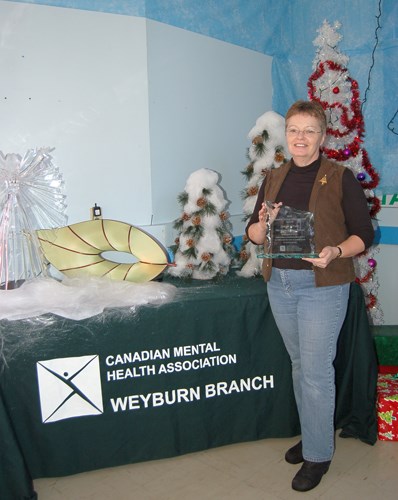A Weyburn woman has been honoured nationally for her efforts to fight the stigma surrounding mental illness and give a voice to those who struggle to speak for themselves.
Susan Grohn, board member of the Weyburn branch of the Canadian Mental Health Association (CMHA) and past-president of the provincial board, won a national award recently for distinguished service to the community. Grohn received the award at a national CMHA awards ceremony in London, Ontario.
The award recognized Grohn's volunteer work for CMHA at the local, provincial and national level, including helping to develop the framework for a national mental health policy and lobbying the government on behalf of those with mental illnesses.
Locally, the CMHA has been praising Grohn's volunteer efforts for over a decade. She was inspired to make a difference in the lives of those with mental illness after a family tragedy struck at Christmastime. Her brother-in-law committed suicide after a long battle with schizophrenia at the age of 38.
"At that point I thought, 'I have to become involved for him,'" said Grohn.
Since then, Grohn is very aware of the depression and anxiety that can engulf someone at this time of year.
"Christmas isn't always a happy time for people," stated Grohn.
As a nurse, Grohn runs a private senior care home, Eden Homes, in Weyburn and said that Christmas can be a very lonely and depressing time for seniors, especially those who have outlived many of their friends and close family members.
Grohn praised many of the local churches who put on special services around Christmastime to remember those who have passed away.
"It's nice to see the churches do that because there is definitely a need there."
Grohn said that loneliness can also be caused by the stigma of mental illness.
"If we take the time to look at those around us and extend a hand to those who are alone or isolated by trying to make them feel like they belong and can join in the spirit of the season and join the community it can be a small step towards helping them."
Grohn offers her services as a volunteer board member at the local and provincial level, but she also finds herself pitching-in at the local CMHA branch office, much like the rest of the board members, according to Grohn. Board members do yard work and minor repairs around the office, in addition to helping out at fundraisers like the CMHA Christmas Store.
Grohn also offers her services as an advocate for the mentally ill and said that there is a great need for assistance at the community-level.
'These people suffering from prolonged mental health issues have trouble standing up for themselves just to get the necessities of life," said Grohn.
Grohn said that for the mentally ill, paying bills, hooking up cable and phone services and providing themselves with regular meals can be problematic.
The programs at the local CMHA are working on changing all of this by bringing mental illness out of the shadows and into the light. They hold regular art programs and hot lunch programs to bring their clients together.
"It's a wonderful place to come because they're not being judged here," said Grohn. "Judgement is probably the biggest reason people stay away."
CMHA's work program is another good outlet for those who cannot hold down a regular job because of their mental illness. CMHA clients can be hired to do several tasks, such as shovelling snow in the winter.
Grohn said that keeping busy is the best way to keep their clients "feet on the ground."
"If you don't feel like you are doing something worthwhile with your life you can fall into depression."
Grohn hopes that once people realize just how many afflictions encompass the term "mental illness" and that sufferers of mental illness often endure their disease by no fault of their own, it will help to de-stigmatize it.
"So many people stand up in support of diabetes and cancer and this is great," said Grohn. "But we have so far to go with mental health."




